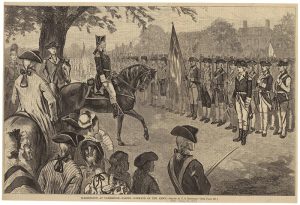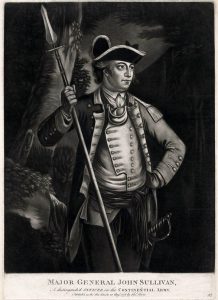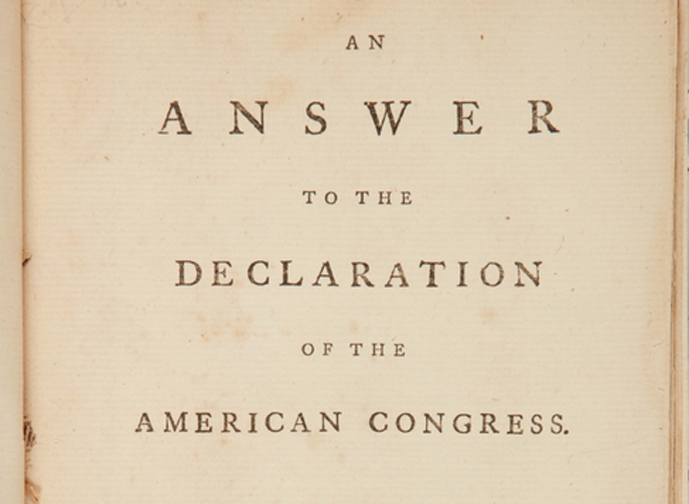In the summer of 1775, Gen. George Washington fell victim to bad information about the Continental Army’s gunpowder supply. When he finally received accurate data, it left him temporarily speechless, fearful of a British attack, and unable to carry out his plans to free Boston. Nearly two hundred years later, a historian created a counter-narrative of Washington responding to that crisis by launching a successful disinformation campaign that fooled the British commanders. That provided a more appealing portrait of the commander-in-chief. Unfortunately, it was based on misread evidence.

After the loss of Bunker’s Hill on 17 June 1775, American Patriots were hungry for information about gunpowder. They shared recipes for saltpeter and news about shipments smuggled in from overseas. On 2 July, Ezekiel Price, living in Milton, Massachusetts, wrote in his diary: “Mr. E[dmund]. Quincy reports that eighteen hundred barrels of powder is arrived at Philadelphia or New York.”[1] Similarly, on 15 August the Rev. Dr. Ezra Stiles of Newport, Rhode Island, noted in his diary: “I am told so that I rely on it, that our Army now have Fifty Tons of Powder,” or a thousand barrels.[2] But those men were just trading optimistic rumors.
One month after George Washington took command of the Continental Army, he discovered how unreliable information about its gunpowder supply was. On his arrival in July 1775, the general had asked for an inventory of powder, and the report came back with “303½ Bbbl’s [barrels] of Powder.” However, on 1 August the Massachusetts Committee of Supplies told him that in reserve “there remains but 36 barells in Store of the Quantity collected from the Towns in this Colony & recd from others.”[3] The larger number had been “an Account of all the Ammunition, which had been collected by the Province” over time. Training, the 17 June battle, and other action had drawn down that stock. Soldiers and artillery companies had powder in their cartridges, but “the whole Stock of the Army at Roxbury & Cambridge & the adjacent posts, consists of 90 Bbbls or thereabouts.”[4]

Washington was already concerned about his army’s gunpowder supply, but the situation was worse than he had imagined. In reporting the news to the New Hampshire government on 5 August, Gen. John Sullivan wrote, “The General was so struck, that he did not utter a word for half an hour. Every one else was also astounded.”[5]
Discovery of that misinformation about the gunpowder supply was probably a low point of the siege of Boston for Gen. Washington. After his half-hour of silence, however, he started to take action. That council of war voted “to make an attempt on the Magazine at Halifax [Nova Scotia] where there is reason to suppose there is a great quantity of Powder.” The next day, Washington wrote to Gov. Nicholas Cooke of Rhode Island, urging him to send a colony ship to raid a gunpowder magazine on Bermuda.[6]
Also on 4 August, Gen. Washington issued general orders designed to preserve the gunpowder on hand:
It is with Indignation and Shame, the General observes, that notwithstanding the repeated Orders which have been given to prevent the firing of Guns, in and about Camps, that it is daily and hourly practised; that contrary to all Orders, stragling Soldiers do still pass the Guards, and fire at a Distance, where there is not the least probability of hurting the enemy, and where no other end is answer’d, but to waste Ammunition, expose themselves to the ridicule of the enemy, and keep their own Camps harrassed by frequent and continual alarms, to the hurt of every good Soldier, who is thereby disturbed of his natural rest, and will at length never be able to distinguish between a real, and a false alarm.[7]
Offering every reason but the real one, the commander forbade any soldier from wasting precious powder by taking potshots at the British troops.
Washington recognized the importance of keeping the shortage secret when he wrote to the Continental Congress on 4 August:
Upon discovering this Mistake, I immediately went up to confer with the Speaker of the [Massachusetts] House of Representatives, upon some Measures to obtain a Supply from the neighbouring Townships, in such a Manner, as might prevent our Poverty being known as it is a Secret of too great Consequence to be divulged in the general Court [i.e., that legislature], some Individual of which might perhaps indiscreetly suffer it to escape him, so as to find its Way to the Enemy the Consequences of which, are terrible even in Idea. I shall also write to the Governours of Rhode Island, & Connecticut, & the Committee of Safety in New Hampshire on this Subject, urging in the most forcible Terms, the Necessity of an immediate Supply if in their Power. I need not enlarge on our melancholy Situation; it is sufficient that the Existence of the Army, & the Salvation of the Country, depends upon something being done for our Relief both speedy and effectual, & that our Situation be kept a profound Secret.[8]
Likewise, in his 5 August letter about the council Sullivan told the New Hampshire government to keep the secret: “Should this matter take air before a supply arrives our army is ruined.” The generals feared that if British commanders were to learn how little gunpowder their enemy had, they might well try to break through the siege lines.
Within days, new supplies of gunpowder arrived in camp from colonies to the south, ending the immediate crisis. On 21 August, Washington’s military secretary Joseph Reed wrote to a friend in Philadelphia, “Captain Ross arrived here on Friday evening with the powder. It was a most seasonable supply.”[9] By early September the Continental Army had enough gunpowder for Gen. Washington to start proposing aggressive new ways to use it: an expedition against Québec, armed schooners off the coast, even an attack on Boston.
Recently, many American authors have described another way that Washington responded to the August gunpowder crisis: by promulgating disinformation. They credit him not just with concealing the shortage but also of spreading a rumor to the British that his army was well stocked with 1,800 barrels.[10] That portrayal turns Washington from a stunned victim of misinformation to a clever deployer of disinformation. It fits into an old national narrative of crafty Americans fooling their stodgy British opponents.
But what is the evidence for that disinformation campaign? The first author to report it was James Thomas Flexner in George Washington in the American Revolution, the 1968 installment in his multi-volume biography. He wrote:
As a first step, he leaked word to the enemy (which their intelligence eagerly gobbled up) that he had eighteen hundred barrels of powder. He started a rumor in his own camp that he was almost embarrassed at having so much…[11]
As his source, Flexner cited a volume in a previous massive biography, Douglas Southall Freeman’s George Washington: Planter and Patriot from 1951.
However, Freeman hadn’t gone that far. Instead, he wrote:
If Washington could not procure from these sources of intelligence [deserters and refugees] much information of real value concerning British plans, he could not fail to be pleased at the success of efforts to keep secret the shortage of powder. The public, in fact, overconfidently exaggerated the size of the supply instead of presenting the scarcity as worse than it was. False reports circulated of large importation and of great stores. Ezekiel Price had heard in July that 1800 barrels of powder had reached Philadelphia; the next month, from its printing house across the salt marshes, the [10 Aug 1775] Boston Gazette had boasted that “the needful” was “not wanting”; Ezra Stiles was told he might rely on it that the Colonies had fifty tons. This, in a sense, was a triumph of the American intelligence service. So was the deception of the British. Royal officers were being misled and, in some instances, were deceiving their own people at home. Those who would listen to such things heard tall tales of the magnitude of desertion from American ranks, and of the unexplained “arrest” of Charles Lee by his own commander’s order. London newspaper readers were soon to be regaled with reports that on August 7, the British, 5000 strong, had attacked “the rebels” and after slaughtering a host had captured [Israel] Putnam and Lee, 2500 other prisoners, a vast number of carefully specified cannon, 6000 stand of small arms, and £100,000 in specie.[12]
In one paragraph Freeman mentioned both Washington’s “efforts to keep secret the shortage of powder” and Ezekiel Price’s rumor about “1800 barrels of powder” quoted at the start of this article. But he never actually said those things were connected. In fact, Price recorded that figure in his diary on 2 July, a month before Gen. Washington learned about the dire shortage.
Freeman documented a wash of false rumors swirling around both sides of the war, but he didn’t credit Washington himself with creating or spreading such rumors. While saying that such “tall tales” helped to mask the American gunpowder shortage, Freeman offered no evidence of a successful disinformation campaign, such as documents from the British side showing that commanders had heard reports that the Americans had lots of powder.[13]
Freeman’s facts weren’t dramatic enough for Flexner. Without citing any new sources, Flexner insisted that Washington himself “leaked word to the enemy (which their intelligence eagerly gobbled up).” This fits a pattern that Edward G. Lengel, editor-in-chief of the Papers of George Washington project, identified in Inventing George Washington. Lengel noted that Freeman was meticulous in his research but produced what critics called a “plodding…portentous” account, “the kind of book that people bought and never read.” In contrast, Lengel wrote:
Where Freeman and other “scientific” historians had been content to rely on these to construct an authentic if somewhat humdrum series of events, Flexner applied his imagination to elucidate on these facts and create vivid scenes and flesh-and-blood characters. Thus, starting from a document describing the bare-bones facts of a certain event, Flexner added the facial expressions, bodily gestures, figures of speech, and private thoughts of Washington and all the other dramatis personae, setting it against the backdrop of a vividly described albeit largely imaginary physical scene. In essence, he wrote a historical novel based on fact, but without admitting it as such.[14]
One of the crucial ingredients of an appealing novel is an active protagonist who has an effect on the world. Flexner told the story of the gunpowder crisis of early August 1775 with Washington taking action: he “started a rumor in his own camp” and fooled the British. That’s not what Freeman had written, and not what the historical sources show. In reality, the solution to the gunpowder crisis was to speed up shipments from other colonies and to smuggle in more. The expeditions to Halifax and Bermuda never panned out, and there is no evidence for a disinformation campaign. Instead, the remedy was an unexciting combination of bureaucracy and logistics.
However, since Flexner presented his book as well-researched non-fiction, many readers and subsequent authors have accepted his version of events—including the tale about Gen. Washington slyly claiming to have 1,800 barrels of powder.
[FEATURED IMAGE AT TOP: Longfellow National Historic Site in Cambridge, Massachusetts. This house was George Washington’s headquarters for 10 months in the Revolutionary War, and noted poet Henry Wadsworth Longellow’s house for nearly fifty years. Source: Daderot/Wikimedia Commons]
[1] Massachusetts Historical Society Proceedings, 7:194.
[2] The Literary Diary of Ezra Stiles, D.D., Ll.D., Franklin Bowditch Dexter, editor (New York: Charles Scribner’s Sons, 1901), 1:600. A barrel contained 100-110 pounds of gunpowder; American Archives, series 4, 2:1035.
[3] Papers of George Washington, Revolutionary War Series [hereafter “PGW:RW”], Philander D. Chase, Dorothy Twohig, Frank E. Grizzard, Edward G. Lengel, et al., editors (Charlottesville: University Press of Virginia, 1985–), 1:211-2, 223-39. Documents in this series can also be found at <founders.archives.gov>.
[4] PGW:RW, 1:216.
[5] Thomas C. Amory, The Military Services and Public Life of Major-General John Sullivan (Boston: Phillips. Sampson, 1859). 16. New Hampshire Provincial and State Papers, 7:572.
[6] Halifax: PGW:RW, 1:216. Bermuda: PGW:RW, 1:221-2, 419-22.
[7] PGW:RW, 1:218-9.
[8] PGW:RW, 1:223-39. Though the general wrote that he and Speaker James Warren kept the gunpowder shortage a secret, on 9 August the Massachusetts legislature started to discuss “a Bill to prevent the waste of Powder by firing at fowl or game of any kind, and marks”; American Archives, series 4, 3:319.
[9] Life and Correspondence of Joseph Reed, William B. Reed, editor (Philadelphia: Lindsay & Blakiston, 1847), 1:118.
[10] The same story appears in a range of recent titles: Ron Chernow’s Washington: A Life, Thomas B. Allen’s George Washington, Spymaster, Jeff Shaara’s Rise to Rebellion, and Laurie Calkhoven’s Daniel at the Siege of Boston.
[11] Flexner, George Washington in the American Revolution, 1775-1783 (Boston: Little, Brown, 1968), 36.
[12] Freeman, George Washington: Planter and Patriot (New York: Scribner, 1951), 517.
[13] One man in the American military claimed to have tried to feed disinformation about the gunpowder supply into Boston: Dr. Benjamin Church, head of the Continental Army’s hospitals. After he was caught sending a ciphered letter to a British army officer, Church pointed to this passage in it: “Twenty tons of powder lately arrived at Philadelphia, Connecticut & Providence. Upwards of 20 tons are now in camp. Salt petre is made in every colony. Powder mills are erected and constantly employed in Philadelphia & New York.” Church insisted those lines showed “that he took care to exaggerate our strength and firmness, with a view to dishearten and intimidate; that he particularly enlarged his accounts of our ammunition, at a time when an attack might have proved fatal, on account of the scarcity of that article…” In fact, the doctor’s letter was dated 23 July, more than a week before the American command knew how acute the gunpowder shortage was. We now know that Church was a paid British agent starting before the war began. Why he wrote those lines in July is a mystery—were they a prearranged code concealing accurate information? Did he have a change of heart and try to triple-cross the British? Regardless, we know Church wasn’t part of any disinformation campaign by Gen. Washington. For more on Church, see Allen French, General Gage’s Informers (Ann Arbor: University of Michigan Press, 1932), and John A. Nagy, Dr. Benjamin Church, Spy (Yardley, Pa.: Westholme, 2013).
[14] Lengel, Inventing George Washington: America’s Founder, in Myth and Memory (New York: HarperCollins, 2011), 174-5.










6 Comments
A Bell article is always interesting and thought-provoking. One point of clarification: Washington’s goal to get powder from Bermuda may have indirectly panned out. The so-called Gunpowder Plot of 1775 ended with other Colonial vessels seizing 112 barrels of powder from the Bermuda magazine and delivering them to Charleston and Philadelphia. Perhaps all or some of the latter were soon transported to Boston overland.
Thanks for the kind words about my articles here! Lots of colonists heard the news of gunpowder in Bermuda, and the expedition that actually got some from that island wasn’t the one Washington asked Rhode Island to send.
The general’s Haifax initiative also had consequences: it probably led to the creation of his schooner force, and perhaps to obtaining the ships that transported Col. Benedict Arnold’s troops up to Maine in September.
In both cases the urgent, perhaps desperate, plans the commander-in-chief and his council of war made as their immediate response to the gunpowder shortage turned out to be ineffective. But of course we don’t want to think of Washington as ineffective.
Another great examples of how historical myths get generated and why primary research is so important to truly understanding historical events. We all want our heroes to be masters of the situation and faultless, but sometimes they react as Washington did, speechless. A very informative article on a pivotal moment of the Boston siege.
Great article!
Excellent article which confirms the pressing need for all of us to look at original sources and not rely on other historians to provide details which often prove to be inaccurate. Thanks once to J.L. Bell for once again setting the record straight.
Great article. Im thrilled to see someone finally take a knock at Flexner! I have alot of issues with not so much his facts, but the particular stances he takes on certain things, stances which cannot possibly be backed by source. Im in the new camp of Washington research; Flexner is no longer the epitome of GW research, rather the Lengel annotated Washington papers still being worked on. And of course the Washington papers are fully available online at the LOC.